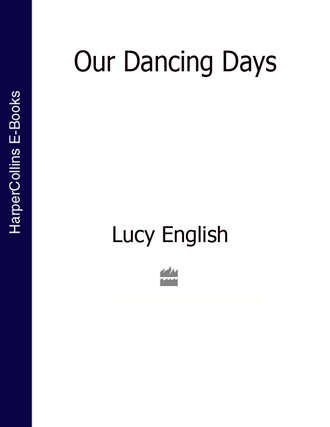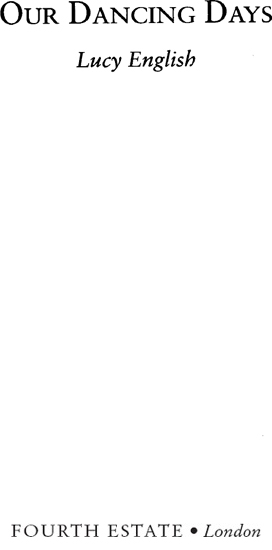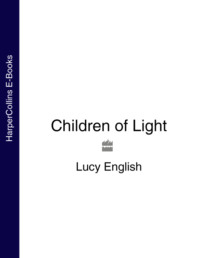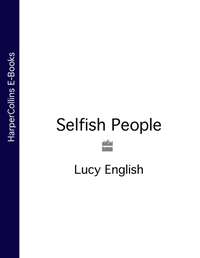
Полная версия
Our Dancing Days


COPYRIGHT
Fourth Estate
A division of HarperCollinsPublishers
1 London Bridge Street
London SE1 9GF
www.harpercollins.co.uk
Copyright © Lucy English 2000
First published in Great Britain in 2000 by Fourth Estate
‘Each Moment’ by the Incredible String Band. Words by Robin Williamson. Reproduced by kind permission of IMP Ltd. Lyrics from ‘Astral Weeks’ by Van Morrison.
The right of Lucy English to be identified as the author of this work has been asserted by her in accordance with the Copyright, Designs and Patents Act 1988.
A catalogue record for this book is available from the British Library.
All rights reserved under International and Pan-American Copyright Conventions. By payment of the required fees, you have been granted the nonexclusive, nontransferable right to access and read the text of this e-book on-screen. No part of this text may be reproduced, transmitted, downloaded, decompiled, reverse-engineered, or stored in or introduced into any information storage and retrieval system, in any form or by any means, whether electronic or mechanical, now known or hereafter invented, without the express written permission of HarperCollins e-books.
HarperCollinsPublishers has made every reasonable effort to ensure that any picture content and written content in this ebook has been included or removed in accordance with the contractual and technological constraints in operation at the time of publication.
Source ISBN: 9781841152424
Ebook Edition © MARCH 2016 ISBN: 9780007485390
Version: 2016-03-23
EPIGRAPH
This was our dancing day
So even those with nothing to celebrate
Shook off their unfathomable gloom
And were lost with us in that meadow.
From ‘Albion’ in Spirit Level, a book of poems by Andrew Bell
CONTENTS
Cover
Title Page
Copyright
Epigraph
Chapter One
Chapter Two
Chapter Three
Chapter Four
Chapter Five
Chapter Six
Chapter Seven
Chapter Eight
Chapter Nine
Chapter Ten
Chapter Eleven
Chapter Twelve
Chapter Thirteen
Chapter Fourteen
Chapter Fifteen
Chapter Sixteen
Chapter Seventeen
Chapter Eighteen
Chapter Nineteen
Chapter Twenty
Chapter Twenty-one
Chapter Twenty-two
Keep Reading
About the Author
Also by the Author
About the Publisher
CHAPTER ONE
Bristol is built on several hills. In Totterdown there is a street that seems to cling to the steepest edge of one on a high embankment above Temple Meads Station. Tessa’s studio was on the top floor of a house in this terrace. From here it wasn’t difficult to entertain the idea that one was floating above the city like the hot-air balloons do on a fine day, but it also wasn’t difficult to imagine the whole street of houses slipping over the embankment; the gardens already lay at perilous angles. It was with this feeling of landing in front of the 10.45 from platform 6 that caused Tessa to stop working and look out of her studio window.
The ten forty-five gathered speed and whirred past harmlessly, but Tessa still felt she had fallen beneath its wheels. She also knew why she felt like this. She had that morning received a letter from her ex. It had just stopped raining and there was a break in the clouds. Sunlight fell onto the other side of Bristol, emphasising the lumpy forms of the university building, the glass edges of the city office blocks, and, pointing up between, the spires of Christchurch and St Mary Redcliffe; Bristol’s skyline was urban but not unpleasant. She could also see the parklands of Ashton Court and the gardens of Brandon Hill, for it was May and the trees were blossoming and fresh.
Smudgy sunlight on pinkish stone, pastel blue between moving clouds, it’s definitely a watercolour, thought Tessa turning from her window and back to her art, but her canvas was dark and red and large with jagged forms like a gaping dragon or a charred accident.
She poked at her work with a brush dipped in vermilion, but only half-heartedly. ‘It’s not savage enough, it’s blunted and dead.’ Letters from Murray always had this effect on her. Tessa’s walls were laden with other brooding canvases; she sold approximately one of these a year. The rest of her work lay in folders, because Tessa was an illustrator; watercolours of gardens, country scenes, Bristol sites, for calendars, birthday cards and coffee-table books. It was Murray who owned the gallery in Bath where she had first exhibited fourteen years ago and they had been lovers for eight of them.
Murray Maclean now lived in Edinburgh reinventing his Scottish roots. He had opened another gallery there, mostly for young Scottish painters. He still had the gallery in Bath but he showed only an indifferent attitude towards it, like he showed towards other left-behind projects. And Tessa was another project, she knew that. His letter was like a public relations handout, with a list of all the artists who would be exhibiting that summer, what cafés he had visited and who would be coming up for the Festival. His letter was like him, smart and to the point. Murray was in his fifties now, tall and elegant with thick grey hair. At the end he said, ‘If you’re up for the Festival Claudia and I would love to see you, that is if she isn’t too busy buying clothes at Baby Gap.’
Tessa stabbed at her painting again with red paint as thick as a placenta. Right from the start she had said to Murray, ‘I don’t want kids. Kids drive you mad.’ They had stayed with that but when he turned fifty women of child-bearing age became more attractive. Claudia was twenty-nine and had just had his baby in March. He met her some months after he split up with Tessa but that didn’t make it any better. ‘We’ll still be friends,’ he said, but he meant, ‘I’ll still sell your paintings.’
The other letter she had received that morning was from her agents and in an hour’s time she had an appointment to see them. Murray had introduced her to Wessex Artists so at least she could be grateful he had given her a living.
*
She left for her appointment on her bicycle and in her cycling gear. Her lodger in the basement, whom she had nothing to do with apart from collecting the rent, referred to her as ‘that dyke’; but what did she know, she was a chirpy English student, what did she know about sharp-looking forty-six-year-olds?
Tessa was sleek and wiry. Her hair, if it had been long, would have been corkscrew curly but she kept it short. It was dark brown, nearly black and the strands of grey at the front she dyed bright red. She wore black or grey, Trousers never skirts. Boyish casual clothes and sometimes a red velvet scarf. Her appearance was clean-cut and unadorned. She looked like she would prefer a day’s cycling to a morning in front of a mirror. She had the taut sun-touched skin of the very fit.
Some women might adopt the boyish look as a tease, ‘Guess what, I’m a real girl underneath,’ but with Tessa it was more complicated. Her appearance said, ‘I’m a woman, but I’m independent,’ or more usually, ‘Clear off’ – but Tessa was not a dyke.
Wessex Artists were on the eleventh floor of a block in the centre of Bristol. The view was panoramic. Tessa waited, watching squalling, reeling seagulls and rain clouds gathering. ‘They’re ready for you now,’ said the secretary.
Coral and Pumpkin looked Tessa up and down. Pumpkin sniffed as if Tessa had arrived fresh from a pig farm.
‘Do sit down,’ she said.
They were misnamed. Coral was round and squashy in voluminous florals. She had fuzzy hair. It was Pumpkin who more resembled a calcinated sea-creature. They were at least ten years older than Tessa, preserved perpetually in a mould made sometime in the fifties. Nice gals. Pumpkin’s suit was tweed-grey like her hair; she was small and neat.
‘Did you read the letter?’ Her voice reminded Tessa of metal tinging.
‘Sure.’ Tessa crossed her legs.
‘Well, what did you think?’ Pumpkin tapped her desk with a pen.
‘It’s OK.’
Pumpkin’s tapping became louder, her mouth pursed.
‘I don’t know what you expect me to say,’ said Tessa after a while; ‘I’ll do it, you know that.’
‘Yes, yes, of course.’ Coral was becoming agitated. ‘It’s just that,’ she caught Pumpkin’s eye, ‘we had a little talk the other day, and eventually, after some time … it was a long talk, Tessa …’
Pumpkin glared. ‘It’s your attitude I’m worried about.’
Tessa laughed. ‘Come on, Pumpkin. I’ll do the work. What is it? Six Christmas cards, the suspension bridge at night, bunny rabbits?’
Pumpkin was silent. Coral fidgeted nervously, wobbling.
Pumpkin patted her skirt. ‘You see, Tessa, you’re good.’ She paused.
‘You’re very good.’ She picked up some papers for emphasis. ‘You’re in demand and yet …’
‘Your watercolours are lovely, Tessa, so sensitive,’ interrupted Coral, ‘… and yet, you treat it as though it were—’
‘Rubbish?’ suggested Tessa.
‘Your other work won’t sell, it won’t ever sell.’ Pumpkin’s voice was steely. ‘Especially now that Murray’s in Scotland,’ she added.
‘I … don’t … care,’ said Tessa like a two-year-old. It was a manner guaranteed to irritate Pumpkin.
Pumpkin sat up straight and smoothed her skirt again. She threw Coral a look. ‘Tell her about the assignment, then.’
‘Oh, yes, well, it’s really nice … last summer do you remember The Historic Houses of Oxfordshire? Well, of course you do.’ She smiled, regarding Pumpkin with caution. ‘They liked your work, said it really made the book … so this time they want …’
‘Seven more books to make a series? Eight more? Fifty more?’
Pumpkin made a hissing sort of noise.
‘Er, no, no, Tessa,’ Coral said, ‘just one more book actually.’ Her eyes were on Pumpkin. ‘They would like you to do six out of fifteen, so you’ve got the lion’s share. Pumpkin, she’s got the lion’s share, hasn’t she … Pumpkin?’
‘Yes,’ said Pumpkin suddenly; ‘six houses, three sketches of each, pencil and wash, there’ll also be photographs, you know the format. So you’ll do it?’
‘Oh, Pumpkin, we didn’t say where, did we? Oh, silly us. The Historic Houses of Suffolk.’
Tessa’s face became uncertain. ‘Suffolk?’
‘Yes, you know, in the east, Ipswich, Norwich …’
‘Norwich is in Norfolk, Coral.’ Pumpkin took a sheet of paper out of a drawer. ‘Choose the ones you want, there’s a description of each, ring us tomorrow when you’ve decided.’
‘I’ll do it now,’ said Tessa briskly; ‘I know Suffolk.’
‘Oh, do you?’ Coral said. ‘I went there for a holiday once, years ago, to a pretty place, it was, near the sea. Well, it was on the sea, actually, there was a lighthouse, I think.’
Tessa scanned the list without paying any attention to Coral. It was taking her a long time. Pumpkin looked at her watch.
‘Suffolk’s lovely,’ continued Coral; ‘Constable country. Well, I didn’t actually go to that bit, but I’ve been told it’s lovely. Where I went it was rather flat …’
Tessa handed the list back.
‘We’ll send you the brief,’ said Pumpkin. ‘Fleming Hall, Bedingfield; well, I thought you might choose that one. Hengrave, yes … Kentwell Hall and Long Melford – don’t forget to see the church … Lavenham, well, there’s plenty there … Heveningham … wasn’t that bought by an Arab? … St John’s Hall? Oh, I am surprised, Tessa, I thought you might have chosen Ickworth, or Alston Court, or Glenham. It’s the smallest one, you know, of minor interest.’
‘But it’s terribly old,’ said Coral; ‘actually it’s the oldest, isn’t it?’ She began to look through a folder.
‘It’s twelfth century,’ said Tessa, ‘but was enlarged in the fourteenth and then again to its present size in 1585. The windows of the great hall came from a nearby nunnery and are in two different styles, decorated and perpendicular.’
‘Oh, I say!’ said Coral.
Pumpkin studied the list. ‘It doesn’t say here about the windows. You know the place, then?’
Tessa stood up to go. ‘Actually, I used to live there.’
She cycled back across Bristol in the rain and up the slow climb to Totterdown. She kicked open her front door and clattered the bicycle in the corridor. Why the bloody hell did I take that on? I don’t want to go to Suffolk, and go to St John’s. Shit! She was soaking wet, and as she threw her wet clothes across the bedroom was confronted with an image of herself first arriving in Bristol after hitching in the rain. She had left Suffolk with nothing, not even a rucksack. She pulled on dry clothes. She was so angry she was close to tears, but it was a long time since Tessa had wept.
I left it all, I left the whole damn lot!
Don had kept sending her things in parcels, and then the money, but she sent it all back. She had bought this house herself with the money she earned from painting and knew every inch of it intimately, since for the last eight years she had scraped and peeled it down to its bones. The house was hers, absolutely hers. Murray had never lived there. Nothing here is yours! She had given up sharing things.
She sat on her bed staring at another of her bleak canvases. Ring up those two bitches, tell them to stuff their assignment! But the hard forms of the painting gave her inspiration; ice and steel, rock and stone, bone. Stone blunts scissors, scissors cut … what’s scaring you? she thought. It was not part of her present self to be emotional. Murray leaving, Claudia’s baby, she had coped with that. It’s a job. Paint the damn place then sod off. She thought how completely she had created her environment here, all hers, bare wood furniture, plain walls, cream, white. She knew everything in her house down to the furthest corner of the most hidden cupboard and her mind scanned these places.
Then she remembered the box she had not sent back. It arrived unexpectedly long after the other parcels and she kept it in her last moment of sentimentality. Under the stairs, seven years ago. She searched it out and took it up to her studio, which was the place she felt most inviolate.
Dusty, a letter – ‘Dear, dear Tessa, please keep these. One day I hope you will forgive us, Don.’ Soppy. Rubbish. She screwed it up. The box was full of photographs. She tipped them on the floor, her life in one heap. There were she and Dee-Dee, spades in hand, smiling in front of the vegetable garden, long hair, wellies, Peruvian jumpers and floppy skirts, stupid clothes for gardening. Don in the orchard in his dressing gown with a basket of apples, smiling. The dressing gown was his coat … St John’s in the snow and all of them outside, smiling. ‘We are the smiling revolution.’ A pile of happy people, summer fairs, winter bonfires.
It wasn’t like that, thought Tessa … And here were she and Don again, in white because that was their wedding. Shit. And she and Dee-Dee swimming in the moat. Tessa felt herself slipping again down the embankment. There were older photographs too; Swinging London, she and Dee-Dee in mini skirts, and now one in black and white, two little girls in a suburban garden, Theresa and Deirdre, puffed sleeves, buckle shoes, arms round each other, smiling …
CHAPTER TWO
It was late August, the Saturday before the bank holiday. The weather throughout the summer had been indifferent, some might even have called it rotten, but Tessa did not care for sunshine for with it came droves of people, in summer clothes, soaking up the day like pink sponges, with noisy children, grandmothers, dogs and radios. And at the moment Tessa did not care for people.
She had now been in Suffolk for ten days. The rain had slowed her work, for although she preferred damp landscapes, it was more difficult to sketch satisfactorily under dripping trees. At Heveningham she tried for two hours to draw the ribbon wall, but spent most of the time in the orangery avoiding a thunderstorm.
She was in her hotel room in Bury St Edmunds surveying her work. She was quite pleased. They were rough sketches on rain-blotched paper, but she could see how they could progress. Remember, light on stone mullions, indigo shadows under cedar trees. She scribbled notes on the paper. Remember, wet skies, big clouds. The light, pale gold, could be pale green. Sienna-ripe wheat, barley’s softer … Tessa had travelled right through Suffolk, from the rolling willow-banked fields of the Essex borders and the Stour valley to the bleaker wheatlands of what is called High Suffolk, which is almost a joke since nothing except church towers are really high in Suffolk, to outside Bury St Edmunds, the hedgeless fields, agribusiness wheat deserts, no weeds, no poppies, no cornflowers. But it’s not got worse, thought Tessa, remembering exactly what it was like to be in the middle of a wheatfield, when the far end of it was ages away, and the trees by the ditches seemed tiny. And Tessa paused with this image of herself, ‘walking away from the Hall’, and as she saw herself becoming tiny in the distance, she felt uneasy and uncertain, for she had yet to go to St John’s.
I’m slipping, she thought, and she was tired, for she had worked hard, concentrating on forms and colours and angles and light and the present, always the present, the now of the image in front of her, nothing at all to do with memories. And Tessa felt sad and vulnerable. Ring up P. and C., said one part of her; oh weak, weak, where’s your steel? Where’s your ice? said another. And she thought of her stark canvases, but they were miles away on the other side of England.
She wrote a postcard to Murray. ‘Hope you enjoy the Festival. Couldn’t make it this year. I’m on an assignment in Suffolk. Love to Claudia and the kid.’ She had never told Murray much about Suffolk and what she did say was rather vague. Oh, I lived there in the seventies with some hippies. Her life before him held little interest for him. He was a man of the present. She licked the stamp. She had a picture of him in her mind at the opening of one of her exhibitions. Murray, in the centre of the room with a group of people around him. He was a tall man. He turned round suddenly to look for her and in that sweeping movement seemed to Tessa like a magician who could conjure up who he wanted, and make disappear who he didn’t want. She decided she wouldn’t write to him again.
She left her room and went to the abbey gardens; the hotel faced one of the old gatehouses. Bury St Edmunds was lively that Saturday; the market was on, the car parks were full, in the abbey gardens were people enjoying themselves in the manner Tessa found so repugnant. But now she was preoccupied.
The abbey, the burial place of St Edmund, had once been huge, the largest ecclesiastical building in Britain. Its size today would compare to a shopping complex, but there was virtually nothing left of it, eroded since the Reformation by weather, and also by townsfolk who used the place as a quarry; there were many houses in Bury built out of the abbey. Only a few portions of wall and excavated foundations remained. The lumps of stone, to Tessa, were baffling, a piece here, another bit at the far end of the gardens. A sign said ‘The Dormitory’ – did monks really sleep there? She couldn’t imagine it – where? There wasn’t anywhere. She stood in the nave by the high altar. Over her head should have been a vaulted roof but instead there was the Suffolk sky with hanging clouds moving slowly. It would have all vanished, thought Tessa, if someone hadn’t preserved it. It was time for her to start working.
From Bury St Edmunds she drove east and north, for St John’s was close to the Norfolk border. She had hitched up and down this road dozens of times but now the road was wider and faster, bypassing all the villages – the windmill at Stanton; Botesdale and Rickinghall Superior, so close to each other they were quite entangled; Walsham-le-Willows. She was watching the road signs. Harlesdon, with its wide, open street and Georgian houses. Ten miles to go. The road ran alongside the Waveney. Here she felt she must know every tree. Wortwell. It’s a job, I’m on a job. Piccadilly Corner. Wasn’t that where? … Six places, three sketches of each … Flixton, the old aerodrome, it’s been ploughed up. Well, the pub’s been tarted … Earsham … I waited for a lift there for three hours once. Then just before Bungay she turned off the main road with the lorries and holiday cars going to Lowestoft, into the lanes, into the area called the Saints, where there’s a local saying that once you get into them you can’t get out, and it seems true, for the roads meander irrationally and the signposts, if you can find them, are confusing. Left, St Margaret’s, right St Margaret’s. But Tessa was not lost. Here the countryside was open and the sky fell right down to the ground uninterrupted. The road swept round in a huge arc avoiding no apparent obstacle. This was the Saints. Left was St Margaret’s, St Michael’s, St James, St George, St Lawrence, the other St Margaret’s; and right was St John’s.
*
St John’s was barely a hamlet, four cottages and a farm close to the church. Once over the bridge there was no more of it, a truly uneventful place. But across the fields was a group of tall trees which the eye was drawn to as the trees in this area were usually solitary; and as the road turned again the Hall could be seen. Tessa saw it now and felt again the impact, for although the Hall was neither huge nor grand it was imposing.

Three of them in a car, cruising round Fulham on a hot day.
‘What shall we dooo?’
‘Come on, Don, you’re full of ideas.’
‘… We could go somewhere.’
‘Yeah, what a turn on.’
And then Don said, ‘I’ve got a super idea’ and Tessa and Dee-Dee fell about laughing. ‘No, honestly, a really good idea … I’ve got a sort of cousin …’
‘Wow.’
‘He lives in the countryside, in an amazing place … stop laughing … right, you don’t believe me, I’ll take you there.’
‘Don, Don, we believe you … mind that lorry! … Don, Don? Where are we going?’
‘Suffolk.’
Three of them in a car all the way to Suffolk, and Tessa and Dee-Dee sang ‘Magical Mystery Tour’ and kept saying ‘are we nearly there yet?’ but as they got further and further from London the joke wore off. They drove for hours beyond Baldock, Royston and Newmarket, for this was when Suffolk was the sleepiest place on earth and nobody ever went there.
They turned the last bend and there was the Hall across the fields. There were more hedges then but it still stood out boldly. The sun shone on its church windows.
Dee-Dee scrambled next to Tessa to get a better look. ‘Oh, oh, is this it?’
‘Yes.’
‘Does he live here by himself? Oh, Don, I’m not smart enough.’
‘He won’t mind.’
The drive was a mud track full of potholes. There was a collection of crumbling barns. The place seemed derelict. They drove into the courtyard, where weeds grew between brick paving under a huge chestnut tree. Three of them, in crumpled London clothes. Dee-Dee pulled her mini skirt straight, but Tessa just stared.




